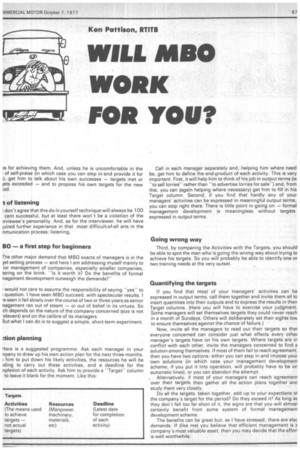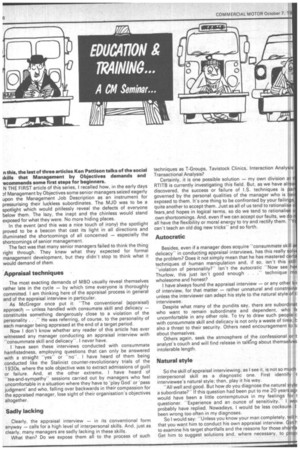WILL PABO
Page 69

Page 68

If you've noticed an error in this article please click here to report it so we can fix it.
WORK FOR YOU?
n this, the last of three articles Ken Pattison talks of the social ;kills that Management by Objectives demands and .ecommends some first steps for beginners.
N THE FIRST article of this series, I recalled how, in the early days A Management by Objectives some senior managers seized eagerly upon the Management Job Description as an instrument for pressurising their luckless subordinates. The MJD was to be a spotlight which would pitilessly reveal the defects of everyone below them. The lazy, the inept and the chinless would stand exposed for what they were. No more hiding places.
In the event (and this was a nice touch of irony) the spotlight proved to be a beacon that cast its light in all directions and illuminated the shortcomings of all concerned — especially the shortcomings of senior management.
The fact was that many senior managers failed to think the thing right through. They knew what they expected for formal management development, but they didn't stop to think what it would demand of them.
Appraisal techniques
The most exacting demands of MBO usually reveal themselves rather late in the cycle — by which time everyone is thoroughly committed. I am thinking here of the appraisal process in general and of the appraisal interview in particular.
As McGregor once put it: "The conventional (appraisal) approach — unless handled with consurnate skill and delicacy — constitutes something dangerously close to a violation of the personality . ." He was referring, of course, to the personality of each manager being appraised at the end of a target period.
Now I don't know whether any reader of this article has ever witnessed any manager conducting an appraisal interview with "consummate skill and delicacy"' . I never have.
I have seen these interviews conducted with consummate hamfistedness, employing questions that can only be answered with a straight "yes" or "no". I have heard of them being conducted like the Stalinist counter-revolutionary trials of the 1930s, where the sole objective was to extract admissions of guilt or failure. And, at the other extreme, I have heard of "tea-and-sympathy" sessions carried out by managers who feel uncomfortable in a situation where they have to 'play God' or 'pass judgment' and who, falling over backwards in their compassion for the appraised manager, lose sight of their organisation's objectives altogether.
Sadly lacking
Clearly, the appraisal interview — in its conventional form anyway — calls for a high level of interpersonal skills. And, just as clearly, many managers are sadly lacking in these skills.
What then? Do we expose them all to the process of such techniques as 1-Groups, Tavistock Clinics, Interaction Analysis Transactional Analysis?
Certainly, it is one possible solution — my own division at t RTITB is currently investigating this field. But, as we have alrea discovered, the success or failure of I.S. techniques is par governed by the personal qualities of the manager who is bei exposed to them. It's one thing to be confronted by your failings quite another to accept them. Just as all of us tend to rationalise o fears,and hopes in logical terms, so do we tend to rationalise o own shortcomings. And, even if we can accept our faults, we do all have the flexibility or moral energy to try and rectify them. "Y can't teach an old dog new tricks" and so forth.
Autocratic
Besides, even if a manager does acquire "consummate skill a delicacy" in conducting appraisal interviews, has this really solv the problem? Does it not simply mean that he has mastered cert techniques of human manipulation and, if so, isn't this still "violation of personality?" Isn't the autocratic "Now see he Thurlow, this just isn't good enough . . .'' technique m wholesome and honest?
I have alWays found the appraisal interview — or any other ki of interview, for that matter — rather unnatural and constraine unless the interviewer can adapt his style to the natural style of t? interviewee.
Despite what many of the pundits say, there are subordinat who want to remain subordinate and dependent, who fE uncomfortable in any other role. To try to draw such people c with consummate skill and delicacy is not only a waste of time, t also a threat to their security. Others need encouragement to about themselves.
Others again, seek the atmosphere of the confessional or t analyst's couch and will find release in talking about themselves intolerable length.
Natural style
So the skill of appraisal interviewing, as I see it, is not so much interpersonal skill as a diagnostic one. First identify t interviewee's natural style; then, play it his way.
"All well and good. But how do you diagnose the natural style a subordinate?" If this question had been put to me 20 years ag( would have been a little contemptuous in my feelings for i questioner. "Experience and an ounce of sensitivity," I woi probably have replied. Nowadays, I would be less cocksure. I been wrong too often in my diagnoses.
So I would say: "Unless you know your man completely, tell Ii that you want him to conduct his own appraisal interview. Get Ito examine his target shortfalls and the reasons for those shortfa Get him to suggest solutions and, where necessary, to prop(
)s for achieving them. And, unless he is uncomfortable in the of self-praise (in which case you can step in and provide it for get him to talk about his own successes — targets met or pets exceeded — and to propose his own targets for the new
t of listening
don't agree that this do-it-yourself technique will always be 100 cent successful, but at least there won't be a violation of the rviewee's personality. And, as for the interviewer, he will have iuired further experience in that most difficult-of-all arts in the nmunicatjon process: listening.
BO — a first step for beginners
The other major demand that M BO exacts of managers is in the jet setting process — and here I am addressing myself mainly to or management of companies, especially smaller companies, tering on the brink. "ls it worth it? Do the benefits of formal nagement development outweigh the demands?"
would not care to assume the responsibility of saying "yesto question. I have seen M BO succeed, with spectacular results. I ,e seen it fail slowly over the course of two or three years as senior nagernent ran out of steam — or out of belief in its virtues. So ch depends on the nature of the company concerned (size is not 'elevant) and on the calibre of its managers.
But what I can do is to suggest a simple, short-term experiment.
:tion planning
Here is a suggested programme: Ask each manager in your npany to draw up his own action plan for the next three months, him to put down his likely activities, the resources he will be ding to carry out these activities, and a deadline for the npletion of each activity. Ask him to provide a "Target" column to leave it blank for the moment. Like this: Call in each manager separately and, helping him where need be, get him to define the end-product of each activity. This is very important. First, it will help him to think of his job in output terms (ie "to sell lorries" rather than ''to advertise lorries for sale") and, from this, you can (again helping where necessary) get him to fill in his Target column. Second, if you find that hardly any of your managers' activities can be expressed in meaningful output terms, you can stop right there. There is little point in going on — formal management development is meaningless without targets expressed in output terms.
Going wrong way
Third, by comparing the Activities with the Targets, you should be able to spot the man who is going the wrong way about trying to achieve his targets. So you will probably be able to identify one or two training needs at the very outset.
Quantifying the targets
If you find that roost of your managers' activities can be expressed in output terms, call them together and invite them all to insert quantities into their outputs and to express the results in their Target columns. (Here you will have to exercise your judgment. Some managers will set themselves targets they could never reach in a month of Sundays. Others will deliberately set their sights low to ensure themselves against the chance of failure.) Now, invite all the managers to read out their targets so that everyone concerned can consider just what effects every other manager's targets have on his own targets. Where targets are in conflict with each other, invite the managers concerned to find a solution among themselves. If most of them fail to reach agreement, then you have two options: either you can step in and impose your own solutions (in which case your management development scheme, if you put it into operation, will probably have to be on autocratic lines), or you can abandon the attempt.
Alternatively, if most of your managers can reach agreement over their targets, then gather all the action plans together and study them very closely.
Do all the targets, taken together, add up to your expections ol the company's target for the period? Do they exceed it? As long as they don't fall too far short of it, the signs are that you will almost certainly benefit from some system of formal management development scheme.
The benefits can be great but, as I have stressed, there are alsc demands. If (like me) you believe that efficient management is company's most valuable asset, then you may decide that the effort is well worthwhile.












































































































